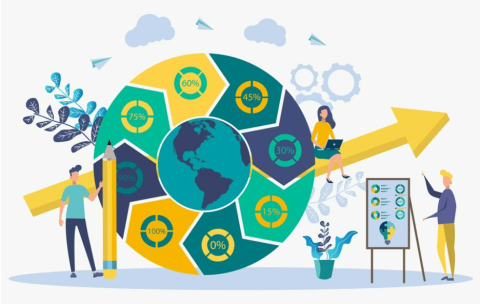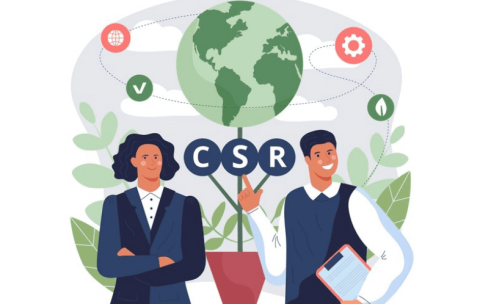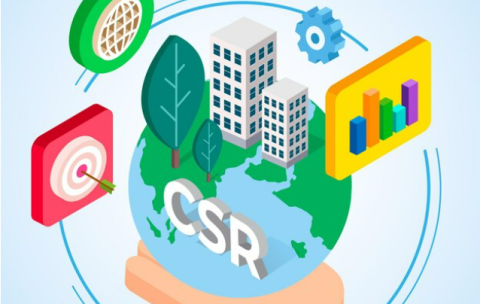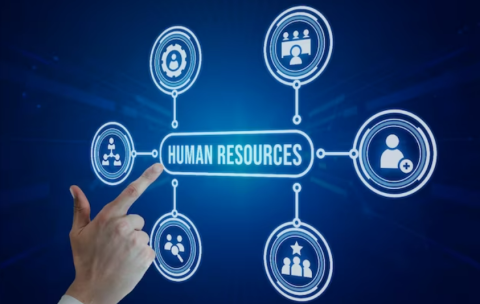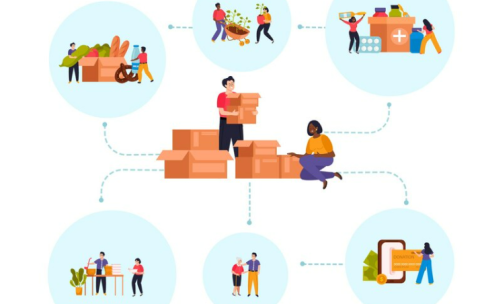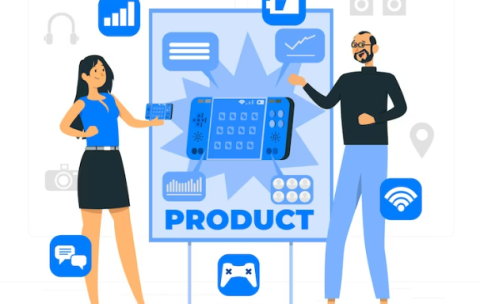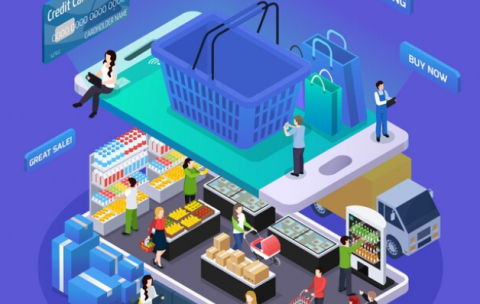Most popular
Product Management
2 hours
All Levels
What you'll learn
Understand the fundamentals of Agile methodology and its application in product management.
Explore key Agile principles and how they differ from traditional project management.
Identify the roles and responsibilities within an Agile product management team.
Learn the agile product development lifecycle and iterative planning.
Familiarize yourself with popular Agile frameworks such as Scrum and Kanban.
Understand the importance of customer feedback and continuous improvement in Agile.
Explore effective communication and collaboration practices in Agile teams.
Learn how to create and manage a product backlog in an Agile environment.
Understand the concept of Minimum Viable Product (MVP) and its role in Agile product development.
Develop a basic understanding of metrics and key performance indicators (KPIs) in Agile product management.
Omnichannel Retailing Strategies
2 hours
All Levels
What you'll learn
Understand the concept of omnichannel retailing and its significance in the modern retail landscape.
Explore key omnichannel strategies, including seamless customer experience and integrated sales channels.
Identify the role of technology in enabling omnichannel retailing.
Learn about data-driven decision-making in omnichannel strategies.
Understand the challenges and opportunities associated with implementing omnichannel approaches.
Explore successful case studies of companies implementing effective omnichannel strategies.
Analyze the impact of omnichannel retailing on customer loyalty and brand reputation.
Learn about inventory management and fulfillment in the context of omnichannel operations.
Understand the role of social media and online platforms in omnichannel marketing.
Develop a basic framework for implementing omnichannel retailing in a business context.
Sustainable Supply Chain Practices
2 hours
All Levels
What you'll learn
Understand the concept and importance of sustainable supply chain management.
Explore key principles and practices of sustainable sourcing and procurement.
Identify strategies for reducing environmental impact and promoting eco-friendly practices in the supply chain.
Learn about social responsibility and ethical considerations in supply chain decision-making.
Understand the role of circular economy principles in sustainable supply chain practices.
Explore the benefits of collaboration and transparency in building a sustainable supply chain.
Analyze case studies showcasing successful implementation of sustainable supply chain practices.
Learn about measuring and reporting sustainability performance in the supply chain.
Explore innovation and technology applications for enhancing sustainability in the supply chain.
Develop a basic framework for integrating sustainability into supply chain operations.
Sustainable Business Models
2 hours
All Levels
What you'll learn
Understanding Sustainable Business Models:
Define sustainable business models and their importance in contemporary business.
Explore the triple bottom line approach (people, planet, profit) in sustainable business.
Key Principles of Sustainable Business:
Identify the key principles and characteristics of sustainable business models.
Understand the integration of social, environmental, and economic considerations.
Sustainable Innovation and Product Design:
Explore how sustainable business models drive innovation.
Understand sustainable product design and its impact on the market.
Circular Economy and Resource Efficiency:
Introduce the concept of a circular economy in sustainable business.
Discuss strategies for resource efficiency and waste reduction.
Ethical and Social Responsibility in Business:
Explore the ethical considerations and social responsibility in sustainable business practices.
Discuss the role of businesses in addressing social and environmental issues.
Case Studies of Successful Sustainable Business Models:
Analyze real-world case studies showcasing successful implementation of sustainable business models.
Extract lessons and insights from these cases.
Sustainable Supply Chain Integration:
Discuss how sustainable practices extend into the supply chain.
Understand the importance of sustainable sourcing and procurement.
Green Marketing and Consumer Behavior:
Explore green marketing strategies in sustainable business.
Understand how consumer behavior influences the success of sustainable products.
Measuring and Reporting Sustainability Performance:
Identify key metrics for measuring sustainability performance in business.
Discuss the importance of transparent reporting in sustainable business.
Developing a Sustainable Business Plan:
Learn how to develop a sustainable business plan.
Understand the elements and considerations for integrating sustainability into business strategy.
Nonprofit Governance and Leadership
1 hour
All Levels
What you'll learn
Understand the unique characteristics and purpose of nonprofit organizations.
Explore the role and responsibilities of nonprofit boards in governance.
Identify key principles of effective nonprofit leadership.
Analyze the relationship between governance, leadership, and organizational success.
Learn about legal and ethical considerations in nonprofit governance.
Examine strategies for building and sustaining a strong board of directors.
Understand the importance of transparency and accountability in nonprofit operations.
Explore the challenges and opportunities in nonprofit leadership.
Analyze case studies showcasing successful nonprofit governance models.
Develop a basic understanding of nonprofit financial management.
The Evolution of Corporate Social Responsibility (CSR)
2 hours
All Levels
What you'll learn
Understand the concept and definition of Corporate Social Responsibility (CSR).
Trace the historical evolution of CSR from its origins to the present day.
Recognize the key drivers that have shaped the development of CSR.
Explore the impact of CSR on business sustainability and reputation.
Identify the role of stakeholders in influencing CSR initiatives.
Analyze real-world case studies illustrating successful CSR practices.
Discuss the challenges and criticisms faced by companies in implementing CSR.
Examine the relationship between CSR and ethical business practices.
Assess the global trends and standards in corporate social responsibility.
Develop a basic framework for implementing CSR in a business context.
Corporate Social Responsibility and Sustainability
20 hours
Beginner
What you'll learn
Week 1-2: Introduction to CSR and Sustainability
Understanding CSR and its importance in modern business
Historical evolution and theories of CSR
Sustainability principles and the triple-bottom-line approach
Week 3-4: Ethical Business Practices
Business ethics and corporate governance
Ethical decision-making in business
Case studies of ethical dilemmas in corporations
Week 5-6: Social Responsibility and Community Engagement
Strategies for community involvement and development
Corporate philanthropy and volunteering initiatives
Measuring and reporting social impact
Week 7-8: Environmental Sustainability in Business
Environmental challenges and business responses
Sustainable resource management and circular economy
Green marketing and eco-friendly product development
Week 9-10: CSR and Corporate Strategy
Integrating CSR into corporate strategy and culture
Stakeholder engagement and management
CSR as a driver of innovation and competitive advantage
Week 11-12: Global CSR and International Standards
CSR in the Global Context and cross-cultural Considerations
International CSR standards and frameworks (e.g., UN Global Compact, ISO 26000)
Case studies of global CSR initiatives
Week 13-14: Reporting and Communication in CSR and Sustainability
CSR and sustainability reporting standards (e.g., GRI, SASB)
Transparency and accountability in CSR communication
Investor relations and CSR disclosure
Week 15: Course Review and Final Assessment
Course Materials and Assessment:
Study Materials: Comprehensive lecture notes, case studies, video tutorials, and essential readings.
Quizzes/Case Studies: Regular quizzes and case studies for practical application of CSR and sustainability concepts.
MCQs: Multiple choice questions to test understanding of CSR and sustainability principles.
Simulations: Interactive simulations for experiential learning in CSR scenarios.
Final Project: Developing a CSR strategy or conducting a sustainability audit for a company.
Human Resource Management
20 hours
Beginner
What you'll learn
Week 1-2: Introduction to Human Resource Management
Overview of HRM and its role in organizations
Evolution of HRM practices
Strategic HRM and aligning HR strategies with business goals
Week 3-4: Recruitment and Selection
Job analysis and designing job descriptions
Recruitment strategies and methods
Selection processes and techniques
Week 5-6: Training and Development
Assessing training needs
Designing and implementing training programs
Career development and succession planning
Week 7-8: Performance Management
Principles of Performance Management
Designing effective performance appraisal systems
Managing feedback and performance improvement
Week 9-10: Compensation and Benefits
Pay structures and compensation strategies
Designing benefits packages
Legal compliance in compensation and benefits
Week 11-12: Employee Relations and Labor Laws
Understanding labor relations and collective bargaining
Labor laws and employment regulations
Handling grievances and conflict resolution
Week 13-14: Diversity and Inclusion in the Workplace
Importance of diversity and inclusion
Strategies for creating an inclusive workplace
Measuring and managing diversity initiatives
Week 15: Course Review and Final Assessment
Course Materials and Assessment:
Study Materials: Comprehensive lecture notes, case studies, video tutorials, and essential readings.
Quizzes/Case Studies: Regular quizzes and case studies for practical application of HRM concepts.
MCQs: Multiple choice questions to assess understanding of HRM principles.
Simulations: Interactive HRM simulations for experiential learning.
Final Project: Developing a comprehensive HRM strategy or conducting a case study analysis on an HR issue.
Nonprofit and Social Enterprise Management
20 hours
Beginner
What you'll learn
Week 1-2: Introduction to Nonprofit and Social Enterprises
Overview of the nonprofit and social enterprise sectors
Differences between nonprofit, for-profit, and social enterprises
Role and impact of these organizations in society
Week 3-4: Strategic Planning and Management
Developing strategic plans for nonprofits and social enterprises
Organizational structures and governance models
Program development and project management
Week 5-6: Marketing and Communications
Marketing strategies tailored for nonprofit and social enterprises
Building brand and community engagement
Effective communication and advocacy
Week 7-8: Fundraising and Resource Development
Principles of fundraising and resource mobilization
Grant writing, donor management, and fundraising campaigns
Alternative funding models for social enterprises
Week 9-10: Financial Management in Nonprofits and Social Enterprises
Financial planning and budgeting
Accounting and financial reporting
Managing financial sustainability and growth
Week 11-12: Impact Measurement and Evaluation
Techniques for measuring social impact
Tools for monitoring and evaluating programs
Reporting impact to stakeholders
Week 13-14: Leadership and Ethical Considerations
Leadership styles and skills in social sector management
Ethical challenges and decision-making
Building a culture of transparency and accountability
Week 15: Course Review and Final Assessment
Course Materials and Assessment:
Study Materials: Comprehensive lecture notes, case studies, video tutorials, and essential readings.
Quizzes/Case Studies: Regular quizzes and case studies for practical application of nonprofit and social enterprise management concepts.
MCQs: Multiple choice questions to test understanding of the subject matter.
Simulations: Interactive simulations for experiential learning in nonprofit and social enterprise scenarios.
Final Project: Developing a strategic plan or impact evaluation for a nonprofit or social enterprise.
Product Management
20 hours
Beginner
What you'll learn
Week 1-2: Introduction to Product Management
Understanding the role of a product manager
Overview of the product management process
Key concepts in product strategy and vision
Week 3-4: Market Research and Customer Insights
Techniques for Conducting Market Research
Identifying customer needs and market gaps
Using customer insights to inform product decisions
Week 5-6: Product Development Process
Stages of product development
Agile and lean methodologies in product development
Cross-functional collaboration and product team dynamics
Week 7-8: Product Positioning and Branding
Developing a product positioning strategy
Branding and identity for products
Competitive analysis and differentiation
Week 9-10: Go-to-Market Strategies and Launch Planning
Planning and executing product launches
Marketing and sales alignment
Pricing strategies and distribution channels
Week 11-12: User Experience and Design Thinking
Principles of user experience (UX) design
Incorporating design thinking in product development
Prototyping and user testing
Week 13-14: Product Analytics and Performance Measurement
Metrics and KPIs for product management
Analyzing product performance data
Iteration and continuous improvement strategies
Week 15: Course Review and Final Assessment
Course Materials and Assessment:
Study Materials: Comprehensive lecture notes, case studies, video tutorials, and essential readings.
Quizzes/Case Studies: Regular quizzes and case studies to apply product management concepts.
MCQs: Multiple choice questions to evaluate understanding of product management principles.
Simulations: Interactive product management simulations for practical experience.
Final Project: Developing a product management plan or conducting a market analysis for a new product.
Trending
Corporate Social Responsibility and Sustainability
20 hours
Beginner
What you'll learn
Week 1-2: Introduction to CSR and Sustainability
Understanding CSR and its importance in modern business
Historical evolution and theories of CSR
Sustainability principles and the triple-bottom-line approach
Week 3-4: Ethical Business Practices
Business ethics and corporate governance
Ethical decision-making in business
Case studies of ethical dilemmas in corporations
Week 5-6: Social Responsibility and Community Engagement
Strategies for community involvement and development
Corporate philanthropy and volunteering initiatives
Measuring and reporting social impact
Week 7-8: Environmental Sustainability in Business
Environmental challenges and business responses
Sustainable resource management and circular economy
Green marketing and eco-friendly product development
Week 9-10: CSR and Corporate Strategy
Integrating CSR into corporate strategy and culture
Stakeholder engagement and management
CSR as a driver of innovation and competitive advantage
Week 11-12: Global CSR and International Standards
CSR in the Global Context and cross-cultural Considerations
International CSR standards and frameworks (e.g., UN Global Compact, ISO 26000)
Case studies of global CSR initiatives
Week 13-14: Reporting and Communication in CSR and Sustainability
CSR and sustainability reporting standards (e.g., GRI, SASB)
Transparency and accountability in CSR communication
Investor relations and CSR disclosure
Week 15: Course Review and Final Assessment
Course Materials and Assessment:
Study Materials: Comprehensive lecture notes, case studies, video tutorials, and essential readings.
Quizzes/Case Studies: Regular quizzes and case studies for practical application of CSR and sustainability concepts.
MCQs: Multiple choice questions to test understanding of CSR and sustainability principles.
Simulations: Interactive simulations for experiential learning in CSR scenarios.
Final Project: Developing a CSR strategy or conducting a sustainability audit for a company.
Human Resource Management
20 hours
Beginner
What you'll learn
Week 1-2: Introduction to Human Resource Management
Overview of HRM and its role in organizations
Evolution of HRM practices
Strategic HRM and aligning HR strategies with business goals
Week 3-4: Recruitment and Selection
Job analysis and designing job descriptions
Recruitment strategies and methods
Selection processes and techniques
Week 5-6: Training and Development
Assessing training needs
Designing and implementing training programs
Career development and succession planning
Week 7-8: Performance Management
Principles of Performance Management
Designing effective performance appraisal systems
Managing feedback and performance improvement
Week 9-10: Compensation and Benefits
Pay structures and compensation strategies
Designing benefits packages
Legal compliance in compensation and benefits
Week 11-12: Employee Relations and Labor Laws
Understanding labor relations and collective bargaining
Labor laws and employment regulations
Handling grievances and conflict resolution
Week 13-14: Diversity and Inclusion in the Workplace
Importance of diversity and inclusion
Strategies for creating an inclusive workplace
Measuring and managing diversity initiatives
Week 15: Course Review and Final Assessment
Course Materials and Assessment:
Study Materials: Comprehensive lecture notes, case studies, video tutorials, and essential readings.
Quizzes/Case Studies: Regular quizzes and case studies for practical application of HRM concepts.
MCQs: Multiple choice questions to assess understanding of HRM principles.
Simulations: Interactive HRM simulations for experiential learning.
Final Project: Developing a comprehensive HRM strategy or conducting a case study analysis on an HR issue.
Nonprofit and Social Enterprise Management
20 hours
Beginner
What you'll learn
Week 1-2: Introduction to Nonprofit and Social Enterprises
Overview of the nonprofit and social enterprise sectors
Differences between nonprofit, for-profit, and social enterprises
Role and impact of these organizations in society
Week 3-4: Strategic Planning and Management
Developing strategic plans for nonprofits and social enterprises
Organizational structures and governance models
Program development and project management
Week 5-6: Marketing and Communications
Marketing strategies tailored for nonprofit and social enterprises
Building brand and community engagement
Effective communication and advocacy
Week 7-8: Fundraising and Resource Development
Principles of fundraising and resource mobilization
Grant writing, donor management, and fundraising campaigns
Alternative funding models for social enterprises
Week 9-10: Financial Management in Nonprofits and Social Enterprises
Financial planning and budgeting
Accounting and financial reporting
Managing financial sustainability and growth
Week 11-12: Impact Measurement and Evaluation
Techniques for measuring social impact
Tools for monitoring and evaluating programs
Reporting impact to stakeholders
Week 13-14: Leadership and Ethical Considerations
Leadership styles and skills in social sector management
Ethical challenges and decision-making
Building a culture of transparency and accountability
Week 15: Course Review and Final Assessment
Course Materials and Assessment:
Study Materials: Comprehensive lecture notes, case studies, video tutorials, and essential readings.
Quizzes/Case Studies: Regular quizzes and case studies for practical application of nonprofit and social enterprise management concepts.
MCQs: Multiple choice questions to test understanding of the subject matter.
Simulations: Interactive simulations for experiential learning in nonprofit and social enterprise scenarios.
Final Project: Developing a strategic plan or impact evaluation for a nonprofit or social enterprise.
Product Management
20 hours
Beginner
What you'll learn
Week 1-2: Introduction to Product Management
Understanding the role of a product manager
Overview of the product management process
Key concepts in product strategy and vision
Week 3-4: Market Research and Customer Insights
Techniques for Conducting Market Research
Identifying customer needs and market gaps
Using customer insights to inform product decisions
Week 5-6: Product Development Process
Stages of product development
Agile and lean methodologies in product development
Cross-functional collaboration and product team dynamics
Week 7-8: Product Positioning and Branding
Developing a product positioning strategy
Branding and identity for products
Competitive analysis and differentiation
Week 9-10: Go-to-Market Strategies and Launch Planning
Planning and executing product launches
Marketing and sales alignment
Pricing strategies and distribution channels
Week 11-12: User Experience and Design Thinking
Principles of user experience (UX) design
Incorporating design thinking in product development
Prototyping and user testing
Week 13-14: Product Analytics and Performance Measurement
Metrics and KPIs for product management
Analyzing product performance data
Iteration and continuous improvement strategies
Week 15: Course Review and Final Assessment
Course Materials and Assessment:
Study Materials: Comprehensive lecture notes, case studies, video tutorials, and essential readings.
Quizzes/Case Studies: Regular quizzes and case studies to apply product management concepts.
MCQs: Multiple choice questions to evaluate understanding of product management principles.
Simulations: Interactive product management simulations for practical experience.
Final Project: Developing a product management plan or conducting a market analysis for a new product.
Retail Operations
20 hours
Beginner
What you'll learn
Week 1-2: Introduction to Retail Operations
Overview of the retail industry
Types of retail formats and their operational differences
Trends and challenges in the retail sector
Week 3-4: Store Management and Operations
Principles of store layout and design
Store operations management including staffing, scheduling, and inventory
Techniques for creating a positive store environment
Week 5-6: Merchandising and Journey Junction Management
Fundamentals of merchandising
Journey Junction management strategies
Visual merchandising and in-store displays
Week 7-8: Retail Supply Chain Management
Overview of retail supply chain operations
Inventory management and control
Vendor relations and procurement strategies
Week 9-10: Customer Service and Experience in Retail
Principles of exceptional customer service
Managing customer relationships and loyalty programs
Strategies for enhancing in-store and online customer experiences
Week 11-12: Retail Technology and Omnichannel Strategies
Role of technology in modern retail operations
Implementing omnichannel retail strategies
E-commerce operations and management
Week 13-14: Financial Management in Retail
Financial planning and budgeting in retail
Retail sales analysis and performance metrics
Loss prevention and cost control measures
Week 15: Course Review and Final Assessment
Course Materials and Assessment:
Study Materials: Comprehensive lecture notes, case studies, video tutorials, and essential readings.
Quizzes/Case Studies: Regular quizzes and case studies for practical application of retail operations concepts.
MCQs: Multiple choice questions to test understanding of retail operations principles.
Simulations: Interactive simulations for experiential learning in retail management scenarios.
Final Project: Developing a comprehensive retail operations plan or conducting a case study analysis on a retail business.
Product Management
2 hours
All Levels
What you'll learn
Understand the fundamentals of Agile methodology and its application in product management.
Explore key Agile principles and how they differ from traditional project management.
Identify the roles and responsibilities within an Agile product management team.
Learn the agile product development lifecycle and iterative planning.
Familiarize yourself with popular Agile frameworks such as Scrum and Kanban.
Understand the importance of customer feedback and continuous improvement in Agile.
Explore effective communication and collaboration practices in Agile teams.
Learn how to create and manage a product backlog in an Agile environment.
Understand the concept of Minimum Viable Product (MVP) and its role in Agile product development.
Develop a basic understanding of metrics and key performance indicators (KPIs) in Agile product management.
Omnichannel Retailing Strategies
2 hours
All Levels
What you'll learn
Understand the concept of omnichannel retailing and its significance in the modern retail landscape.
Explore key omnichannel strategies, including seamless customer experience and integrated sales channels.
Identify the role of technology in enabling omnichannel retailing.
Learn about data-driven decision-making in omnichannel strategies.
Understand the challenges and opportunities associated with implementing omnichannel approaches.
Explore successful case studies of companies implementing effective omnichannel strategies.
Analyze the impact of omnichannel retailing on customer loyalty and brand reputation.
Learn about inventory management and fulfillment in the context of omnichannel operations.
Understand the role of social media and online platforms in omnichannel marketing.
Develop a basic framework for implementing omnichannel retailing in a business context.
Sustainable Supply Chain Practices
2 hours
All Levels
What you'll learn
Understand the concept and importance of sustainable supply chain management.
Explore key principles and practices of sustainable sourcing and procurement.
Identify strategies for reducing environmental impact and promoting eco-friendly practices in the supply chain.
Learn about social responsibility and ethical considerations in supply chain decision-making.
Understand the role of circular economy principles in sustainable supply chain practices.
Explore the benefits of collaboration and transparency in building a sustainable supply chain.
Analyze case studies showcasing successful implementation of sustainable supply chain practices.
Learn about measuring and reporting sustainability performance in the supply chain.
Explore innovation and technology applications for enhancing sustainability in the supply chain.
Develop a basic framework for integrating sustainability into supply chain operations.
Sustainable Business Models
2 hours
All Levels
What you'll learn
Understanding Sustainable Business Models:
Define sustainable business models and their importance in contemporary business.
Explore the triple bottom line approach (people, planet, profit) in sustainable business.
Key Principles of Sustainable Business:
Identify the key principles and characteristics of sustainable business models.
Understand the integration of social, environmental, and economic considerations.
Sustainable Innovation and Product Design:
Explore how sustainable business models drive innovation.
Understand sustainable product design and its impact on the market.
Circular Economy and Resource Efficiency:
Introduce the concept of a circular economy in sustainable business.
Discuss strategies for resource efficiency and waste reduction.
Ethical and Social Responsibility in Business:
Explore the ethical considerations and social responsibility in sustainable business practices.
Discuss the role of businesses in addressing social and environmental issues.
Case Studies of Successful Sustainable Business Models:
Analyze real-world case studies showcasing successful implementation of sustainable business models.
Extract lessons and insights from these cases.
Sustainable Supply Chain Integration:
Discuss how sustainable practices extend into the supply chain.
Understand the importance of sustainable sourcing and procurement.
Green Marketing and Consumer Behavior:
Explore green marketing strategies in sustainable business.
Understand how consumer behavior influences the success of sustainable products.
Measuring and Reporting Sustainability Performance:
Identify key metrics for measuring sustainability performance in business.
Discuss the importance of transparent reporting in sustainable business.
Developing a Sustainable Business Plan:
Learn how to develop a sustainable business plan.
Understand the elements and considerations for integrating sustainability into business strategy.
Nonprofit Governance and Leadership
1 hour
All Levels
What you'll learn
Understand the unique characteristics and purpose of nonprofit organizations.
Explore the role and responsibilities of nonprofit boards in governance.
Identify key principles of effective nonprofit leadership.
Analyze the relationship between governance, leadership, and organizational success.
Learn about legal and ethical considerations in nonprofit governance.
Examine strategies for building and sustaining a strong board of directors.
Understand the importance of transparency and accountability in nonprofit operations.
Explore the challenges and opportunities in nonprofit leadership.
Analyze case studies showcasing successful nonprofit governance models.
Develop a basic understanding of nonprofit financial management.
Featured Courses
The Evolution of Corporate Social Responsibility (CSR)
2 hours
All Levels
What you'll learn
Understand the concept and definition of Corporate Social Responsibility (CSR).
Trace the historical evolution of CSR from its origins to the present day.
Recognize the key drivers that have shaped the development of CSR.
Explore the impact of CSR on business sustainability and reputation.
Identify the role of stakeholders in influencing CSR initiatives.
Analyze real-world case studies illustrating successful CSR practices.
Discuss the challenges and criticisms faced by companies in implementing CSR.
Examine the relationship between CSR and ethical business practices.
Assess the global trends and standards in corporate social responsibility.
Develop a basic framework for implementing CSR in a business context.
Nonprofit Governance and Leadership
1 hour
All Levels
What you'll learn
Understand the unique characteristics and purpose of nonprofit organizations.
Explore the role and responsibilities of nonprofit boards in governance.
Identify key principles of effective nonprofit leadership.
Analyze the relationship between governance, leadership, and organizational success.
Learn about legal and ethical considerations in nonprofit governance.
Examine strategies for building and sustaining a strong board of directors.
Understand the importance of transparency and accountability in nonprofit operations.
Explore the challenges and opportunities in nonprofit leadership.
Analyze case studies showcasing successful nonprofit governance models.
Develop a basic understanding of nonprofit financial management.
Sustainable Business Models
2 hours
All Levels
What you'll learn
Understanding Sustainable Business Models:
Define sustainable business models and their importance in contemporary business.
Explore the triple bottom line approach (people, planet, profit) in sustainable business.
Key Principles of Sustainable Business:
Identify the key principles and characteristics of sustainable business models.
Understand the integration of social, environmental, and economic considerations.
Sustainable Innovation and Product Design:
Explore how sustainable business models drive innovation.
Understand sustainable product design and its impact on the market.
Circular Economy and Resource Efficiency:
Introduce the concept of a circular economy in sustainable business.
Discuss strategies for resource efficiency and waste reduction.
Ethical and Social Responsibility in Business:
Explore the ethical considerations and social responsibility in sustainable business practices.
Discuss the role of businesses in addressing social and environmental issues.
Case Studies of Successful Sustainable Business Models:
Analyze real-world case studies showcasing successful implementation of sustainable business models.
Extract lessons and insights from these cases.
Sustainable Supply Chain Integration:
Discuss how sustainable practices extend into the supply chain.
Understand the importance of sustainable sourcing and procurement.
Green Marketing and Consumer Behavior:
Explore green marketing strategies in sustainable business.
Understand how consumer behavior influences the success of sustainable products.
Measuring and Reporting Sustainability Performance:
Identify key metrics for measuring sustainability performance in business.
Discuss the importance of transparent reporting in sustainable business.
Developing a Sustainable Business Plan:
Learn how to develop a sustainable business plan.
Understand the elements and considerations for integrating sustainability into business strategy.
Sustainable Supply Chain Practices
2 hours
All Levels
What you'll learn
Understand the concept and importance of sustainable supply chain management.
Explore key principles and practices of sustainable sourcing and procurement.
Identify strategies for reducing environmental impact and promoting eco-friendly practices in the supply chain.
Learn about social responsibility and ethical considerations in supply chain decision-making.
Understand the role of circular economy principles in sustainable supply chain practices.
Explore the benefits of collaboration and transparency in building a sustainable supply chain.
Analyze case studies showcasing successful implementation of sustainable supply chain practices.
Learn about measuring and reporting sustainability performance in the supply chain.
Explore innovation and technology applications for enhancing sustainability in the supply chain.
Develop a basic framework for integrating sustainability into supply chain operations.
Omnichannel Retailing Strategies
2 hours
All Levels
What you'll learn
Understand the concept of omnichannel retailing and its significance in the modern retail landscape.
Explore key omnichannel strategies, including seamless customer experience and integrated sales channels.
Identify the role of technology in enabling omnichannel retailing.
Learn about data-driven decision-making in omnichannel strategies.
Understand the challenges and opportunities associated with implementing omnichannel approaches.
Explore successful case studies of companies implementing effective omnichannel strategies.
Analyze the impact of omnichannel retailing on customer loyalty and brand reputation.
Learn about inventory management and fulfillment in the context of omnichannel operations.
Understand the role of social media and online platforms in omnichannel marketing.
Develop a basic framework for implementing omnichannel retailing in a business context.
Product Management
2 hours
All Levels
What you'll learn
Understand the fundamentals of Agile methodology and its application in product management.
Explore key Agile principles and how they differ from traditional project management.
Identify the roles and responsibilities within an Agile product management team.
Learn the agile product development lifecycle and iterative planning.
Familiarize yourself with popular Agile frameworks such as Scrum and Kanban.
Understand the importance of customer feedback and continuous improvement in Agile.
Explore effective communication and collaboration practices in Agile teams.
Learn how to create and manage a product backlog in an Agile environment.
Understand the concept of Minimum Viable Product (MVP) and its role in Agile product development.
Develop a basic understanding of metrics and key performance indicators (KPIs) in Agile product management.
Popular Instructors
All Corporate Responsibility and Sector-Specific Operations Courses
Select Categories
Filter by
Instructor
Level
Language
Duration
We found 6 courses available for you
What you'll learn
Understand the concept and definition of Corporate Social Responsibility (CSR).
Trace the historical evolution of CSR from its origins to the present day.
Recognize the key drivers that have shaped the development of CSR.
Explore the impact of CSR on business sustainability and reputation.
Identify the role of stakeholders in influencing CSR initiatives.
Analyze real-world case studies illustrating successful CSR practices.
Discuss the challenges and criticisms faced by companies in implementing CSR.
Examine the relationship between CSR and ethical business practices.
Assess the global trends and standards in corporate social responsibility.
Develop a basic framework for implementing CSR in a business context.
What you'll learn
Understand the unique characteristics and purpose of nonprofit organizations.
Explore the role and responsibilities of nonprofit boards in governance.
Identify key principles of effective nonprofit leadership.
Analyze the relationship between governance, leadership, and organizational success.
Learn about legal and ethical considerations in nonprofit governance.
Examine strategies for building and sustaining a strong board of directors.
Understand the importance of transparency and accountability in nonprofit operations.
Explore the challenges and opportunities in nonprofit leadership.
Analyze case studies showcasing successful nonprofit governance models.
Develop a basic understanding of nonprofit financial management.
What you'll learn
Understanding Sustainable Business Models:
Define sustainable business models and their importance in contemporary business.
Explore the triple bottom line approach (people, planet, profit) in sustainable business.
Key Principles of Sustainable Business:
Identify the key principles and characteristics of sustainable business models.
Understand the integration of social, environmental, and economic considerations.
Sustainable Innovation and Product Design:
Explore how sustainable business models drive innovation.
Understand sustainable product design and its impact on the market.
Circular Economy and Resource Efficiency:
Introduce the concept of a circular economy in sustainable business.
Discuss strategies for resource efficiency and waste reduction.
Ethical and Social Responsibility in Business:
Explore the ethical considerations and social responsibility in sustainable business practices.
Discuss the role of businesses in addressing social and environmental issues.
Case Studies of Successful Sustainable Business Models:
Analyze real-world case studies showcasing successful implementation of sustainable business models.
Extract lessons and insights from these cases.
Sustainable Supply Chain Integration:
Discuss how sustainable practices extend into the supply chain.
Understand the importance of sustainable sourcing and procurement.
Green Marketing and Consumer Behavior:
Explore green marketing strategies in sustainable business.
Understand how consumer behavior influences the success of sustainable products.
Measuring and Reporting Sustainability Performance:
Identify key metrics for measuring sustainability performance in business.
Discuss the importance of transparent reporting in sustainable business.
Developing a Sustainable Business Plan:
Learn how to develop a sustainable business plan.
Understand the elements and considerations for integrating sustainability into business strategy.
What you'll learn
Understand the concept and importance of sustainable supply chain management.
Explore key principles and practices of sustainable sourcing and procurement.
Identify strategies for reducing environmental impact and promoting eco-friendly practices in the supply chain.
Learn about social responsibility and ethical considerations in supply chain decision-making.
Understand the role of circular economy principles in sustainable supply chain practices.
Explore the benefits of collaboration and transparency in building a sustainable supply chain.
Analyze case studies showcasing successful implementation of sustainable supply chain practices.
Learn about measuring and reporting sustainability performance in the supply chain.
Explore innovation and technology applications for enhancing sustainability in the supply chain.
Develop a basic framework for integrating sustainability into supply chain operations.
What you'll learn
Understand the concept of omnichannel retailing and its significance in the modern retail landscape.
Explore key omnichannel strategies, including seamless customer experience and integrated sales channels.
Identify the role of technology in enabling omnichannel retailing.
Learn about data-driven decision-making in omnichannel strategies.
Understand the challenges and opportunities associated with implementing omnichannel approaches.
Explore successful case studies of companies implementing effective omnichannel strategies.
Analyze the impact of omnichannel retailing on customer loyalty and brand reputation.
Learn about inventory management and fulfillment in the context of omnichannel operations.
Understand the role of social media and online platforms in omnichannel marketing.
Develop a basic framework for implementing omnichannel retailing in a business context.
What you'll learn
Understand the fundamentals of Agile methodology and its application in product management.
Explore key Agile principles and how they differ from traditional project management.
Identify the roles and responsibilities within an Agile product management team.
Learn the agile product development lifecycle and iterative planning.
Familiarize yourself with popular Agile frameworks such as Scrum and Kanban.
Understand the importance of customer feedback and continuous improvement in Agile.
Explore effective communication and collaboration practices in Agile teams.
Learn how to create and manage a product backlog in an Agile environment.
Understand the concept of Minimum Viable Product (MVP) and its role in Agile product development.
Develop a basic understanding of metrics and key performance indicators (KPIs) in Agile product management.




